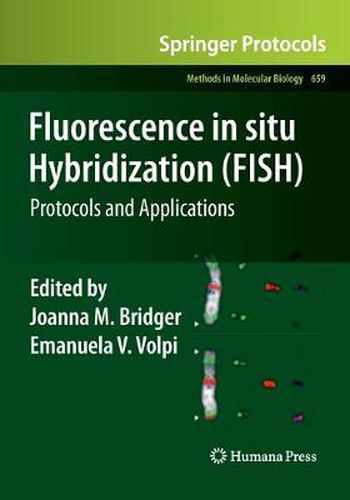Readings Newsletter
Become a Readings Member to make your shopping experience even easier.
Sign in or sign up for free!
You’re not far away from qualifying for FREE standard shipping within Australia
You’ve qualified for FREE standard shipping within Australia
The cart is loading…






This title is printed to order. This book may have been self-published. If so, we cannot guarantee the quality of the content. In the main most books will have gone through the editing process however some may not. We therefore suggest that you be aware of this before ordering this book. If in doubt check either the author or publisher’s details as we are unable to accept any returns unless they are faulty. Please contact us if you have any questions.
Fluorescence in situ Hybridization (FISH) belongs to that special category of well-established molecular biology techniques that, since their inception a few decades ago, have succeeded in keeping a prominent position within the constantly expanding list of laboratory pro- dures for biomedical research and clinical diagnostics. The design simplicity and cost-effectiveness of the early FISH protocols, combined with the signifcant acceleration of discoveries in related technical areas such as fuor- cence microscopy, digital imaging, and nucleic acid technology have prompted the div- sifcation of the original technique into an outstanding number of imaginative and useful applications, and thus have not only held back its outmoding but have also promoted its expansion into different areas of basic and applied research in the post-genomic era. The 34 chapters included in this book aim at portraying the vibrant complexity and diversity of the current FISH protocol landscape, providing cutting-edge examples of va- ous applications for genetic and developmental research, cancer research, reproductive medicine, diagnostic and prognostic purposes, microbial ecology, and evolutionary st- ies. The book is divided in four parts: (I) Core Techniques, (II) Technical Advancements and Novel Adaptations, (III) Translational FISH: Applications for Human Genetics and Medicine, and (IV) Protocols for Model Organisms.
$9.00 standard shipping within Australia
FREE standard shipping within Australia for orders over $100.00
Express & International shipping calculated at checkout
This title is printed to order. This book may have been self-published. If so, we cannot guarantee the quality of the content. In the main most books will have gone through the editing process however some may not. We therefore suggest that you be aware of this before ordering this book. If in doubt check either the author or publisher’s details as we are unable to accept any returns unless they are faulty. Please contact us if you have any questions.
Fluorescence in situ Hybridization (FISH) belongs to that special category of well-established molecular biology techniques that, since their inception a few decades ago, have succeeded in keeping a prominent position within the constantly expanding list of laboratory pro- dures for biomedical research and clinical diagnostics. The design simplicity and cost-effectiveness of the early FISH protocols, combined with the signifcant acceleration of discoveries in related technical areas such as fuor- cence microscopy, digital imaging, and nucleic acid technology have prompted the div- sifcation of the original technique into an outstanding number of imaginative and useful applications, and thus have not only held back its outmoding but have also promoted its expansion into different areas of basic and applied research in the post-genomic era. The 34 chapters included in this book aim at portraying the vibrant complexity and diversity of the current FISH protocol landscape, providing cutting-edge examples of va- ous applications for genetic and developmental research, cancer research, reproductive medicine, diagnostic and prognostic purposes, microbial ecology, and evolutionary st- ies. The book is divided in four parts: (I) Core Techniques, (II) Technical Advancements and Novel Adaptations, (III) Translational FISH: Applications for Human Genetics and Medicine, and (IV) Protocols for Model Organisms.